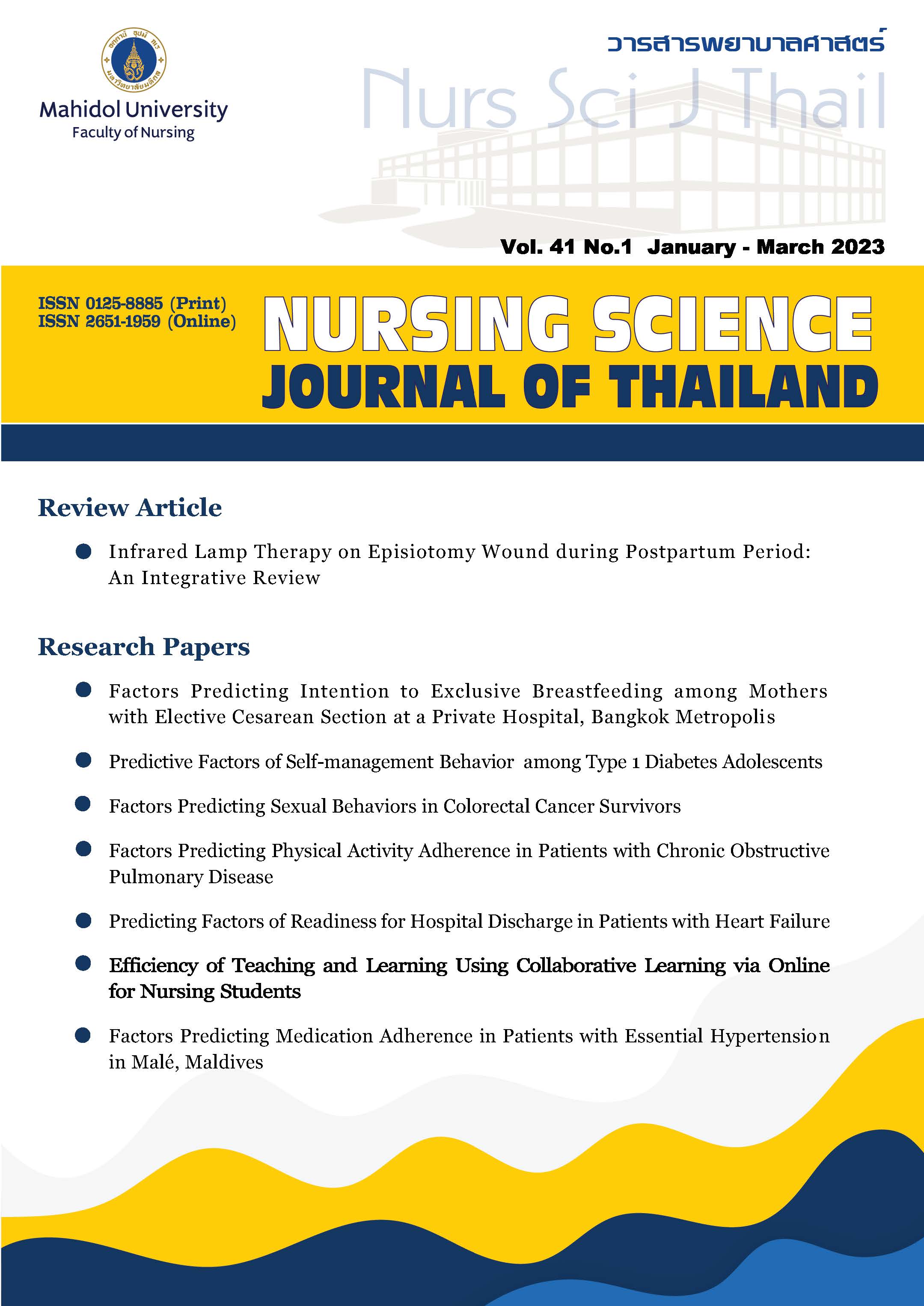Predictive Factors of Self-management Behavior among Type 1 Diabetes Adolescents
Main Article Content
Abstract
Purpose: The purpose of this study was to examine the predictive ability of health literacy, intrinsic motivation, and depression on self-management behavior among type 1 diabetes adolescents.
Design: Correlational predictive design.
Methods: The study sample included 113 patients, aged between 13-18 years, who attended Child and Adolescent Diabetes Clinics in three tertiary care public hospitals. The subjects were recruited by convenience sampling. Data were collected using questionnaires: demographic data questionnaire, self-management of type 1 diabetes for adolescents questionnaire, health literacy of type 1 diabetes adolescents questionnaire, intrinsic motivation for diabetes management questionnaire, and children’s depression inventory. Data were analyzed by multiple linear regression.
Main findings: According to the findings, health literacy, intrinsic motivation and depression could jointly explain 13% - 48% of the variances in five aspects of self-management behavior among type 1 diabetes adolescents. Depression could significantly predict all five aspects among type 1 diabetes adolescents while intrinsic motivation could significantly predict only three aspects. Interestingly, depression could not predict any aspects of self-management behavior.
Conclusion and recommendations: The health literacy and intrinsic motivation can significantly predict self-management behavior among type 1 diabetes adolescents. Therefore, healthcare team should develop program to promote health literacy and intrinsic motivation of type 1 diabetes adolescents in order to increase more appropriate self-management behavior of these adolescents.
Article Details

This work is licensed under a Creative Commons Attribution-NonCommercial-NoDerivatives 4.0 International License.
Copyright Notice: Nursing Science Journal of Thailand has exclusive rights to publish and distribute the manuscript and all contents therein. Without the journal’s permission, the dissemination of the manuscript in another journal or online, and the reproduction of the manuscript for non-educational purpose are prohibited.

Disclaimer: The opinion expressed and figures provided in this journal, NSJT, are the sole responsibility of the authors. The editorial board bears no responsibility in this regard.
References
International Diabetes Federation. IDF diabetes atlas, ninth edition 2019 [Internet]. Brussels: International Diabetes Federation; 2019 [cited 2019 Nov 12]. Available from: https://diabetesatlas.org/idfawp/resource-files/2019/07/IDF_diabetes_atlas_ninth_edition_en.pdf.
Poomthavorn P. Type 1 diabetes in children and adolescents [Internet]. Bangkok: Faculty of Medicine Ramathibodi Hospital, Mahidol University; 2017 [cited 2022 Jan 24] Available from: https://www.rama.mahidol.ac.th/atrama/issue030/health-station. (in Thai).
American Diabetes Association. Classification and diagnosis of diabetes: standards of medical care in diabetes-2019. Diabetes Care. 2019;42 Suppl 1:13-28. doi: 10.2337/dc19-S002.
Wherrett D, Huot C, Mitchell B, Pacaud D. Type 1 diabetes in children and adolescents. Can J Diabetes. 2013;37 Suppl 1:153-62. doi: 10.1016/j.jcjd.2013.01.042.
American Diabetes Association. Classification and diagnosis of diabetes: standards of medical care in diabetes-2021. Diabetes Care. 2021;44 Suppl 1:15-33. doi: 10.2337/dc21-S002.
Wisting L, Bang L, Skrivarhaug T, Dahl-Jorgensen K, Ro O. Psychological barriers to optimal insulin therapy: more concerns in adolescent females than males. BMJ Open Diabetes Res Care. 2016;4(1): e000203. doi: 10.1136/bmjdrc-2016-000203.
Grey M, Knafl K, McCorkle R. A framework for study of self- and family management of chronic conditions. Nurs Outlook. 2006;54(5):278-86. doi: 10.1016/j.outlook.2006.06.004.
Grey M, Schulman-Green D, Knafl K, Reynolds NR. A revised self- and family management framework. Nurs Outlook. 2015;63(2):162-70. doi: 10.1016/j.outlook.2014.10.003.
Delamater AM, Daigre AL, Marchante AN, Pulgaron ER, Patino-Fernandez AM, Sanchez J. Intrinsic motivation in ethnic minority youth with type 1 diabetes. Child Health Care. 2017;46(3):215-29. doi: 10.1080/02739615.2015.1124777.
Guo J, Whittemore R, Grey M, Wang J, Zhou Z-G, He G-P. Diabetes self-management, depressive symptoms, quality of life and metabolic control in youth with type 1 diabetes in China. J Clin Nurs. 2013;22(1-2):69-79. doi: 10.1111/j.1365-2702.2012.04299.x.
Rechenberg K, Whittemore R, Holland M, Grey, M. General and diabetes-specific stress in adolescents with type 1 diabetes. Diabetes Res Clin Pract. 2017;130:1-8. doi: 10.1016/j.diabres.2017.05.003.
Whittemore R, Liberti L, Jeon S, Chao A, Jaser SS, Grey, M. Self-management as a mediator of family functioning and depressive symptoms with health outcomes in youth with type 1 diabetes. West J Nurs Res. 2014;36(9):1254-71. doi: 10.1177/0193945913516546.
Ontrakrai N, Jintrawet U, Chotibang J. Factors related to self-management behaviors in adolescent with type 1 diabetes. Nursing Journal. 2021;48(2):246-58. (in Thai).
Sørensen K, Van den Broucke S, Fullam, J, Doyle G, Pelikan J, Slonska Z, et al. Health literacy and public health: a systematic review and integration of definitions and models. BMC Public Health. 2012;12:80. doi: 10.1186/1471-2458-12-80.
Riangkam C, Wattanakitkrileart D, Ketcham A, Sriwijitkamol A. Health literacy, self-efficacy, age and visual acuity predicting on self-care behaviors in patients with type 2 diabetes. Nursing Science Journal of Thailand. 2016;34(4):35-46. (in Thai).
Ryan RM, Deci EL. Intrinsic and extrinsic motivation: classic definitions and new directions. Contemp Educ Psychol. 2000;25(1):54-67. doi: 10.1006/ceps.1999.1020.
Alvarado-Martel D, Ruiz Fernandez MA, Cuadrado Vigaray M, Carrillo A, Boronat M, Exposito Montesdeoca A, et al. Identification of psychological factors associated with adherence to self-care behaviors amongst patients with type 1 diabetes. J Diabetes Res. 2019;6271591. doi: 10.1155/2019/6271591.
Kovacs M. Children's depression inventory 2nd edition (CDI 2). Toronto, ON: Multi-Health Systems; 2011. 157 p.
Cohen J. Statistical power analysis for the behavioral sciences. 2nd ed. Mahwah, NJ: Routledge; 1988. 567 p.
Schilling LS, Dixon JK, Knafl KA, Lynn MR, Murphy K, Dumser S, et al. A new self-report measure of self-management of type 1 diabetes for adolescents. Nurs Res. 2009;58(4):228-36. doi: 10.1097/NNR.0b013e3181ac142a.
Trangkasombat U, Likanapichitkul D. Depressive symptoms in children: a study using the children's depression inventory. Journal of the Psychiartist Association of Thailand. 1996;41(4):222-30. (in Thai).
Petprayoon S, Wattanakitkrileart D, Pongthavornkamol K, Peerapatdit T. The influence of perceived severity, health literacy, and family support on self-care behavior of patients with type 2 diabetes mellitus. Journal of Nursing Science Chulalongkorn University. 2014;26(1):38-51. (in Thai).


